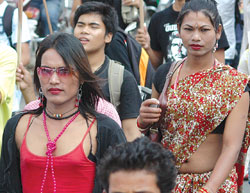|
|
| OUT IN FORCE: Sexual minorities marching for equal rights in Kathmandu last year |
Transgender people in Nepal will now have the opportunity to study to become hairdressers and beauticians under a new scheme funded by the Norwegian government.
The beauty and hair treatment courses, as well as cooking, catering and waiter training, will be offered as part of a three-year, 49,000-dollar project funded by the Norwegian Agency for Development Cooperation and run by Blue Diamond Society, a Kathmandu-based NGO fighting for the rights of sexual minorities and active in the field of AIDS prevention.
Transvestites are a particularly marginalised and vulnerable group with little or no access to the job market, and frequent violence directed against them. Sexual minorities experience regular extortion, exclusion from family and society, verbal and physical abuse, sexual abuse and rape, arbitrary detention, blackmail and even murder.
Norway says it is committed to fighting sexual discrimination wherever it occurs as part of its development policy. "We want to empower socially excluded people and protect their rights by helping them to be included in the mainstream socio-political dialogue," Norway's Environment and International Development Minister Erik Solheim told the Nepali Times on Wednesday.
Because of their physical appearance, transgender people are often prohibited from attending school and experience great difficulties in finding jobs. The project seeks to provide income-generating skills training in order to give sexual minorities, who often work in the sex industry, the opportunity to seek alternative jobs.
"In addition to securing their survival, this will also prove that given the opportunity, sexual and gender minorities can contribute to society," Solheim added.
But helping transgender people find proper jobs is not the only aim of the Norwegian-sponsored project. One of the main concerns is having their rights protected under the new Nepali constitution.
Metis, as transgender males are known in Nepal, have repeatedly been the victims of acts of violence by the police in the past, as reported by Human Rights Watch and gay and lesbian advocacy groups.
They have often been accused of 'obscene acts' and 'immoral behaviour', and reportedly criminalised even for carrying around condoms, seen as evidence of their illegal activity (\'Obsecnity\',#355). But many of them have been making a living from prostitution because of widespread discrimination and lack of legal protection.
By coincidence, the launch of the Norwegian program, which had started taking shape as early as in 2006, comes in the wake of a landmark verdict by Nepal's Supreme Court issued on 21 December 2007. The top court ruled that laws should be changed in order to grant sexual minorities the same rights as other
citizens.
"Lesbian, gay, bisexual, transsexual and inter-sex people are also 'natural persons' though they are not masculine or feminine from the perspective of gender," the court said. "They should be allowed to enjoy all the rights defined by national and international human rights law and instruments."
The ruling was a major victory for the Blue Diamond Society, which had filed a petition with the Supreme Court asking to put an end to legal discrimination against sexual minorities. The group's director, Sunil Pant, hailed the decision as "extremely progressive".
The priority now is ensuring that the newly-rehabilitated citizens are granted concrete opportunities to become economically self-sufficient, he added.



